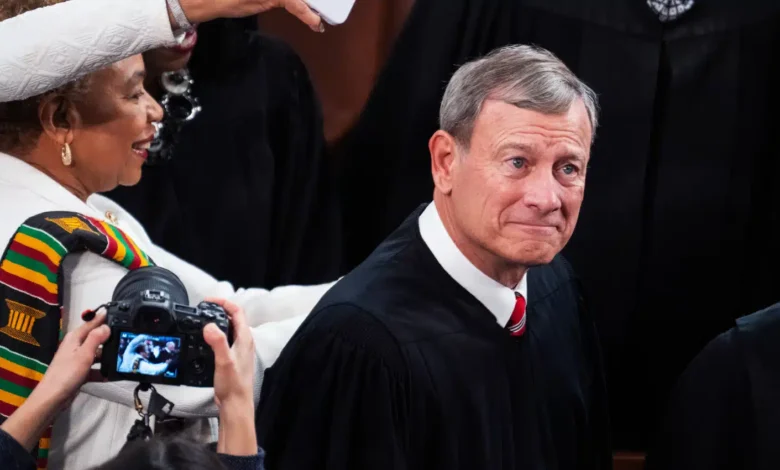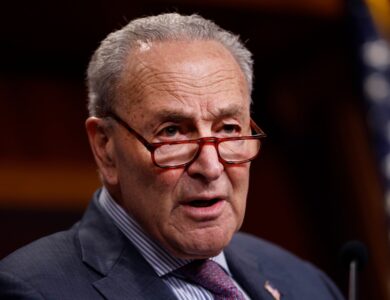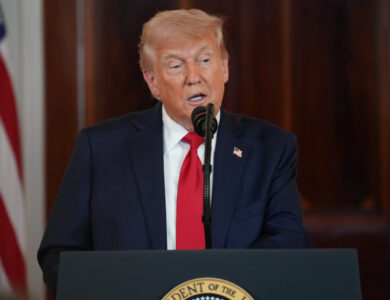Chief Justice Roberts Makes Confession About ‘Secretive Trip’

Chief Justice John Roberts made a rare public appearance on Wednesday evening, speaking at an awards dinner in Buffalo, New York, where he addressed various topics related to the Supreme Court.
Roberts took part in a Q&A session with U.S. District Judge Lawrence J. Vilardo, who at one point asked him about his experience as a prominent public figure. The event was broadcast on C-SPAN3.
Read more: Stunning Moment — Trump Just FIRED Her In Front of Everyone
“Let’s talk about your role in terms of you as a public figure,” Vilardo said. “Obviously, you’re very recognizable. People know who you are. You have to be on all the time, like now. And how do you separate that from your private life? How do you keep some privacy in your life and have this bigger-than-life role as chief justice of the United States?”
Roberts responded that once, while vacationing abroad with his wife, another American citizen mistook him for former House Speaker John Boehner (R-Ohio).
“My wife and I were on vacation in Portugal last year. And another American came up to us. And he looked at me and says, ‘I know you. I know who you are. You’re John Boehner,’” Roberts said, spurring laughter from the audience.
Read more: SCOTUS BETRAYAL: Amy Coney Barrett SLAMS Trump – Makes Disturbing Announcement
“I had to spend the whole evening pretending to be John Boehner. So, when you say readily recognizable, really not, to be honest with you,” Roberts continued.
“It’s getting worse, though, in general, just because the work of the court is getting to a higher degree of publicity. So, it is a problem,” he added. “I will say, 99% of the interactions I’ve had with people, they come up and say hello, which is fine. And so, that’s good. But we’re not as recognizable as you might think.”
WATCH:
Read more: Dershowitz Reveals Way Trump Can Legally Continue Mass Deportations
Earlier this week, a pro-Trump legal organization founded by White House deputy chief of staff Stephen Miller filed a lawsuit against Roberts, marking a long-shot effort as Trump allies push back against court rulings that have blocked key executive actions.
The suit, brought by the America First Legal Foundation, targets Roberts in his role as head of the U.S. Judicial Conference, as well as Robert J. Conrad, director of the Administrative Office of the U.S. Courts, Fox News reported.
The complaint alleges that both the Judicial Conference and the Administrative Office have engaged in regulatory actions that exceed their constitutional mandate, arguing such actions fall outside the judiciary’s core responsibilities of adjudicating cases and providing administrative support.
The lawsuit also contends that records maintained by the U.S. Judicial Conference, under Roberts’ leadership, should be subject to Freedom of Information Act (FOIA) requests as a consequence of the alleged regulatory actions.
In its lawsuit, America First Legal cited actions taken in 2023 by both the Judicial Conference and the Administrative Office to “accommodate” congressional requests to investigate alleged ethical misconduct by Justices Clarence Thomas and Samuel Alito. The group also pointed to efforts by these bodies to develop or adopt an “ethics code” for Supreme Court justices as part of its complaint.
“Under our constitutional tradition, accommodations with Congress are the province of the executive branch,” AFL said, adding: “The Judicial Conference and the Administrative Office are therefore executive agencies,” and should therefore be overseen by the president, not the courts.
The U.S. Judicial Conference serves as the national policymaking body for the federal judiciary. Led by the Chief Justice, it is responsible for making biannual recommendations to Congress as necessary, Fox noted.
“A pro-Trump legal group founded by White House aide Stephen Miller is suing Supreme Court Chief Justice John Roberts…
— America First Legal (@America1stLegal) May 6, 2025
The lawsuit was filed by America First Legal.” pic.twitter.com/33QjS9j5xO
Read more: Police Arrest Florida Man For Bomb Threat Against Trump
Led by attorney Will Scolinos, plaintiffs for AFL argued in the suit that the Judicial Conference’s duties are “executive functions,” and as such, they are functions the AFL alleges must be supervised by executive officers “who are appointed and accountable to other executive officers.”





